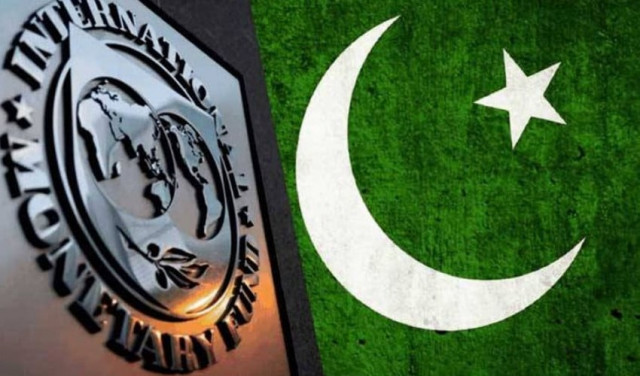IMF narrows focus on new tax measures
IMF urges Pakistani authorities to listen to its experts instead of relying on the arguments about ground realities.

The International Monetary Fund has narrowed down its focus in the new budget to mainly on additional tax measures and rebalancing the National Finance Commission award, as the government badly struggles finding any space to provide relief to the salaried class and the real estate sector.
The salaried class has been hit the hardest which, according to the fresh details, paid an all-time record high Rs437 billion in income taxes in just 10 months of this fiscal year. The amount is higher by Rs150 billion compared to last year.
The IMF on Thursday urged the Pakistani authorities to listen to its experts instead of relying on the arguments about ground realities or the Laffer Curve tax theory, the sources said. The Pakistani authorities mentioned low revenues due to high tax rates, which the IMF did not appreciate, they added.
During a separate session, the IMF also raised questions on the working of the Federal Board of Revenue to cut taxes for the salaried class, said the government sources. They added the IMF was of the view that the proposed reduction in rates for the salaried class may result in far higher relief than claimed by the government. The FBR was now in the process of redoing the salaried class taxation slabs.
The sources said that during the kick-off meeting with Finance Minister Muhammad Aurangzeb on Thursday for the budget approval, the IMF's outgoing mission Chief Nathan Porter narrowed down his mission's focus to four areas.
The topmost priority of the IMF would be the revenue measures to back the Rs14.307 trillion tax target and rebalancing the distribution of fiscal resources under the NFC without affecting the constitutional scheme. The sources said that the other two areas of interest during the talks will be any savings from the downsizing of the government and the privatisation agenda in the next fiscal year. ]
The provinces get 57.5% shares in the federal taxes and the government was trying to hold back some of the sums without amending the Constitution. During a meeting last week, a cabinet minister had recommended getting 50% of the additional defense spending from the provinces due to increasing requirements after India's naked hostilities against Pakistan.
The IMF team virtually began discussions on the new budget from Turkey on Wednesday. The team plans to travel to Islamabad next week for the last round of talks ending on May 23rd.
The sources said that during the kick-off meeting, the Pakistani authorities raised the issue of higher tax rates leading to low collection in certain areas. However, the IMF outgoing mission chief advised to listen to his experts. The IMF team seemed not impressed by the Laffer Curve economic theory.
During a taxation related meeting with the FBR, the authorities shared the proposal of reducing taxes for the salaried class. The sources said that the government proposed increasing the income tax exemption threshold from Rs600,000 to Rs1.2 million per annum.
It also proposed setting new slab rates of 10%, 25%, 33% and 35% while upwardly adjusting the income levels where these slabs will become effective. However, the IMF's view was that this would significantly dent the revenues.
According to the fresh details, the salaried persons paid a whooping record Rs437 billion during July-April period of this fiscal year, which was Rs150 billion more than the last fiscal year. With two months remaining, the additional contribution would increase to around Rs190 billion compared to Rs75 billion that the government had claimed in June last year.
The merit warrants that the salaried class burden should be lowered by at least Rs100 billion, as anything lower than would not end the discrimination with the class.
The sources said that the government did not have enough fiscal space to give meaningful relief to the real estate sector. The initial proposal is to reduce the withholding taxes on the sale and purchase of the properties by only 0.5% each. The FBR wanted that after lowering the taxes, these should be treated as final liability but the Finance Minister asked to keep these adjustable.
There was also a proposal to introduce a new slab of capital gains tax for the higher earnings from the property, said the sources.
This week the discussions also took place within the government to reduce the sales tax on packaged milk. Some members of the FBR proposed to reduce the rate from 18% to either 15% or 17%. However, no decision was taken with one senior official suggesting to keep the rate unchanged.
The 18% sales tax on packaged milk is the highest in the world despite higher malnutrition in Pakistan. While making a decision on reducing tax on milk, the FBR officials did not have a clear idea about the price of the packaged milk in the market.
The tax authorities had also proposed to slap federal excise duty on biscuits but there was no agreement on that within the government. The proposal of slapping a new tax on biscuits and discussing at the level of the finance minister shows the insensitivity of the government.
The sources said that the government was also considering two options with regards to the withdrawal of tax-free status of the erstwhile federally administered tribal areas. One proposal was to introduce the standard 18% rate while the second proposal was to introduce a 10% rate, said the sources. However, the final decision will be taken by the senior leadership of the PML-N, said the sources.




1724319076-0/Untitled-design-(5)1724319076-0-208x130.webp)


















COMMENTS (1)
Comments are moderated and generally will be posted if they are on-topic and not abusive.
For more information, please see our Comments FAQ